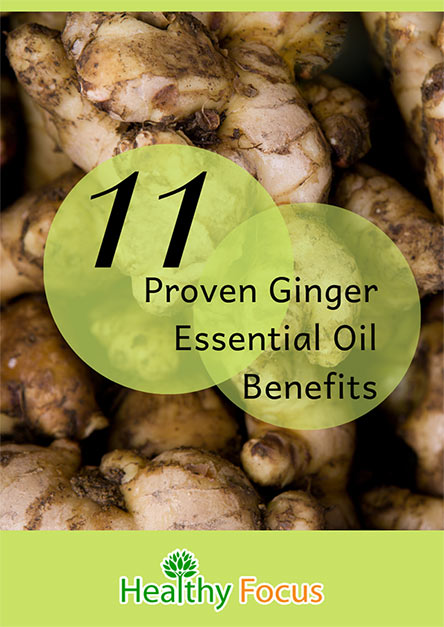Ginger Essential Oil
Ginger root is a very important part of Asian cuisine which has also proven to be an effective medicinal herb. For many centuries, ginger has been used to treat a host of ailments ranging from digestive issues to respiration and its essential oil is now used to treat those and so many more.
Overview
Ginger essential oil is derived from the flowering ginger plant which belongs to the Zingiberacae family. While the plant has been used for centuries and maybe even millennia, its essential oil is becoming increasingly popular to treat an incredible range of ailments because of its high content of gingerol and other important medicinal compounds.
While its traditional use as a digestive aid remains, it is also used to relieve nausea, reduce inflammation, treat respiratory complaints and deal with disorders related to menstruation and so much more.
Ginger Essential Oil Properties and Composition
Ginger essential oil contains over a hundred chemical compounds including various gingerols and sesquiterpenes which give it its medicinal benefits.
Its main components are:
- Alpha-pinene
- Beta-myrcene
- Sabinene
- Terpinen4-ol
- Beta-pinene
- Germacrene
- Limonene.
Its wide ranging therapeutic benefits are derived from its analgesic, anti-inflammatory, antibacterial, antioxidant and expectorant properties among others.
Ginger Essential Oil Benefits
1. For Digestion
Ginger oil and the ginger root itself has been used for generations to treat issues related to poor digestion including upset stomachs, colic, diarrhea, intestinal spasms and indigestion. Several studies have confirmed that these traditional uses have merit and ginger oil is considered one of the best natural remedies for many digestive complaints.
A very recent study published in 2015 analyzed the protective activity of ginger oil on the digestive systems of rats. The experiment which induced gastric ulcers in the rodent subjects found that gastric lesions like necrosis and hemorrhaging of the gastric walls were greatly reduced following oral treatment with ginger essential oil. (1)
Other studies have demonstrated that ginger essential oil was able to reduce both nausea and stress following surgery. In fact, inhaling ginger essential oil alone could both reduce feelings of nausea and reduce pain temporarily following surgical procedures. (2)
Despite the lack of scientific evidence, there is more than enough anecdotal proof that ginger essential oil can help treat many other digestive complaints ranging from indigestion to diarrhea.
2. For Respiratory Problems
One of the most common uses of ginger essential oil is to treat the broad range of respiratory problems associated with the cold and flu that many people are afflicted by each year. It is also effective against other respiratory complaints such as bronchitis and asthma.
It works so well for these complaints because the oil helps get rid of the build-up of mucus from the throat and the airways. It has very powerful expectorant properties meaning it can lubricate the airways and help you to overcome the breathing problems that you are so familiar with.
When it comes to the symptoms of asthma, ginger essential oil has the potential to ease the sufferer’s symptoms safely and naturally. Asthma is caused by muscular spasms as well as inflammation of the linings of the lungs and an increase in mucus production.
Sufferers will be all too familiar with the breathing difficulties caused by their condition and delighted to know that studies have demonstrated that ginger essential oil provides natural relief.
Because of its outstanding anti-inflammatory actions, ginger essential oil can help reduce the swelling in the airways and lungs and help open the system sufficiently to allow easier breathing. Other effective essential oils for asthma include peppermint, eucalyptus and tea tree oil which can be combined with ginger to great effect.
3. For Infections and Oral Health
While it is not among the most popular essential oils for antibacterial purposes, there is plenty of evidence to suggest that ginger essential oil is indeed a powerful natural antiseptic which could be used to destroy infections. It is especially effective in killing oral infections caused by gum disease or an infected tooth and may also be effective against the bacteria which leads to dysentery or food poisoning.
In the area of Southeast Asia where I live, ginger root is one of the most common and effective natural remedies for toothache and tooth infection. While most people use the ginger root itself, the essential oil can also be used by adding a few drops to a glass of water and gargling with it several times a day.
Alternatively, you can apply the oil directly to the infected area with a Q-tip until it has dissipated.
4. Heart Health
If there is anything more important than the health of your heart, I would like to hear about it. Heart disease is one of the most common causes of death and serious illness in the world today and researchers have been trying to find a natural remedy for a very long time.
According to research, ginger can help protect the heart in several different ways. Preliminary studies have demonstrated that it might help reduce cholesterol levels and also help to prevent blood clotting that can potentially lead to coronary disease.
Ginger essential oil also has powerful natural antioxidants which can help protect against the damaging oxidative stress caused by environmental factors and the general aging process helping us to stay healthier for longer.
5. Muscle and Joint Pain
There are few essential oils better than ginger to ease your muscular aches and pains after a hard day on your feet or following a long run. Ginger essential oil has excellent anti-inflammatory and analgesic properties that will work brilliantly on your aches and pains by easing the pain and reducing any inflammation.
Massage this oil combined with a good carrier oil into your muscles and joints each evening and you will find yourself more equipped to face the next day of challenges.
If you are suffering from joint inflammation and pain caused by rheumatism or arthritis then ginger oil mat well provide the natural relief that you need. I have found it very effective in relieving the arthritis in my hands as well as being one of the few remedies that help overcome the horrendous pain of gout.
Ginger oil is so effective because of the presence of a compound called zingibain which gives it those wonderful natural anti-inflammatory actions. Don’t forget that inflammation affects not only muscles and joints but is responsible for a whole host of medical conditions including headaches, migraines and internal problems which affect the organs.
A study published in 2013 concluded that this essential oil possessed significant anti-inflammatory and antioxidant abilities which helped mice to combat acute inflammation and destroy free radicals. (3)
6. Antioxidant Ability
Ginger essential oil as well as the root itself contain a very rich amount of natural antioxidants which can help prevent cellular damage. Much of this damage is oxidative stress caused by free radicals that we encounter every day just by going about our daily lives but also from diet.
Oxidative stress is linked inextricably to an array of very serious illnesses including cancer and heart disease as well as more obvious aging signs that are very visible on the skin.
Ginger oil has a proven ability to combat this oxidative stress and prevent cellular decay by effectively stealing electrons from the lipids which cause the damage in the first place.
Many studies have demonstrated that ginger and ginger oil could prevent oxidative stress and studies have also showed that rodents fed with ginger experienced a reduction in organ damage caused by a restriction in blood supply known as ischemia. (4)
7. For Liver Function
The liver is one of the body’s most hard working organs and one that deserves more respect than we tend to give it. Ginger oil’s has exhibited liver protective potential as well as its antioxidant abilities is several scientific studies.
A recent study published in 2013 set out to examine the efficacy of ginger essential oil in the treatment of alcohol related fatty liver diseases. Alcoholic liver disease can lead to extremely serious and life threatening conditions like liver cancer and cirrhosis.
The study which was conducted on mice found that treatment with ginger oil displayed significant hepatoprotective activity when administered as part of a liquid diet. (5)
8. Problems Related to Menstruation
Ginger essential oil might offer some excellent natural relief against many of the symptoms that ladies suffer owing to menstruation. These common symptoms include cramping, bloating, backaches, headaches and general soreness as well as mood problems.
There is research which indicates that consuming a few drops of ginger essential oil is more effective when it comes to muscular pain than many commonly prescribed painkillers because of its excellent analgesic effects and its natural ability to stimulate circulation.
A study conducted in Georgia published in 2010 found that ginger supplements helped reduce inflammation and relieve muscular pain among the 74 subjects. (6)
As well as its ability to relieve pain and inflammation, ginger oil can also have a very positive impact on general mood including the type of mood issues related to menstruation.
9. Mood and Anxiety
Many essential oil can have an extremely positive effect on the mind including treating those debilitating feelings of depression or anxiety. Like most natural solutions to mental issues, there is absolutely no guarantee that they will work for you but evidence suggests that when diffused, ginger essential oil can have a very positive effect on the mind.
- Diffusing the oil at night may also help to deal with sleep problems like insomnia especially when the problem is caused by anxiety.
10. For Libido
There is plenty of anecdotal evidence out there that ginger essential oil can help you out when it comes to sexual issues like lack of desire or impotence.
I have never been totally sold on the ability of essential oils to increase the libido but there are enough people who swear by their ability that I feel it should be mentioned. As I have always said in these reviews, there is certainly no harm in trying and I wish you all the best.
11. Radioprotective
A very recent study in 2016 may show that Ginger Essential Oil may have radioprotective benefits. This study was done on mice subjected to whole-body gamma-irradiation. Ginger essential oil appeared to reduce cellular damage to bone marrow and chromosomal aberrations. The study is still in process—and more studies will need to be done to determine if there is any benefit for humans. (7)
How to use it
Like so many other essential oils, there are plenty of ways to use ginger oil depending on the condition that you are trying to treat.
- For muscular and joint pain: Dilute your ginger oil in a suitable carrier oil and massage it into your aching muscles and swollen joints several times a day.
- For respiration: add a single drop of ginger oil to a cup of soothing tea such as green tea twice a day. Alternatively add a few drops to a bowl or sink full with hot water and inhale its vapors for 5 minutes each evening before bed.
- For improved digestion: you can add a drop to your tea or a few drops to your bath.
- For general mood and anxiety issues: simply add your ginger oil to your diffuser machine and breathe in its vapors throughout the day.
- For nausea: there are several effective methods of use including direct inhalation from the bottle or the hands. Alternatively. Massage a few drops into your stomach and temples.
- For circulation: massage a few drops of diluted ginger oil into the heart region of your chest twice a day.
(1) http://www.ncbi.nlm.nih.gov/pubmed/24756059
(2) http://www.ncbi.nlm.nih.gov/pmc/articles/PMC3953654/
(3) http://www.ncbi.nlm.nih.gov/pubmed/24020099
(4) http://www.ncbi.nlm.nih.gov/books/NBK92775/
(5) http://www.ncbi.nlm.nih.gov/pubmed/24171385
(6) http://www.sciencedaily.com/releases/2010/05/100519131130.htm
(7) http://www.ncbi.nlm.nih.gov/pubmed/27039766

Leave a Reply
You must be logged in to post a comment.